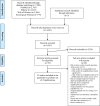Health-Risk Behaviour in Deprived Neighbourhoods Compared with Non-Deprived Neighbourhoods: A Systematic Literature Review of Quantitative Observational Studies
- PMID: 26506251
- PMCID: PMC4624433
- DOI: 10.1371/journal.pone.0139297
Health-Risk Behaviour in Deprived Neighbourhoods Compared with Non-Deprived Neighbourhoods: A Systematic Literature Review of Quantitative Observational Studies
Abstract
Background: There has been increasing interest in neighbourhoods' influence on individuals' health-risk behaviours, such as smoking, alcohol consumption, physical activity and diet. The aim of this review was to systematically review recent studies on health-risk behaviour among adults who live in deprived neighbourhoods compared with those who live in non-deprived neighbourhoods and to summarise what kind of operationalisations of neighbourhood deprivation that were used in the studies.
Methods: PRISMA guidelines for systematic reviews were followed. Systematic searches were performed in PubMed, Embase, Web of Science and Sociological Abstracts using relevant search terms, Boolean operators, and truncation, and reference lists were scanned. Quantitative observational studies that examined health-risk behaviour in deprived neighbourhoods compared with non-deprived neighbourhoods were eligible for inclusion.
Results: The inclusion criteria were met by 22 studies. The available literature showed a positive association between smoking and physical inactivity and living in deprived neighbourhoods compared with non-deprived neighbourhoods. In regard to low fruit and vegetable consumption and alcohol consumption, the results were ambiguous, and no clear differences were found. Numerous different operationalisations of neighbourhood deprivation were used in the studies.
Conclusion: Substantial evidence indicates that future health interventions in deprived neighbourhoods should focus on smoking and physical inactivity. We suggest that alcohol interventions should be population based rather than based on the specific needs of deprived neighbourhoods. More research is needed on fruit and vegetable consumption. In future studies, the lack of a uniform operationalisation of neighbourhood deprivation must be addressed.
Conflict of interest statement
Figures

References
-
- WHO. Health 21. The health for all policy framework for the WHO European Region. World Health Organization, 1999. - PubMed
-
- Mackenbach JP, Bos V, Andersen O, Cardano M, Costa G, Harding S, et al. Widening socioeconomic inequalities in mortality in six Western European countries. Int J Epidemiol. 2003;32(5):830–7. - PubMed
-
- Diez Roux AV, Mair C. Neighborhoods and health. Ann N Y Acad Sci. 2010;1186(1):125–45. - PubMed
-
- Kawachi I, Berkman L, eds. Neighborhoods and Health. New York: Oxford University Press; 2003.
Publication types
MeSH terms
LinkOut - more resources
Full Text Sources
Other Literature Sources
Miscellaneous

